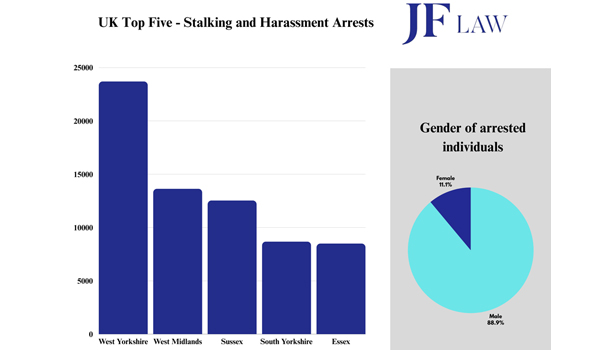Stalking and harassment arrests rise by 75 per cent in five years, according to new data
Thirty-one UK police forces made 185,345 arrests on charges of stalking or harassment between April 2019 and March 2024, with arrests rising by 75 per cent in that time, according to new data.
Men accounted for almost 90 per cent of the arrests, according to police figures.
This data, collected by criminal injury claim specialists JF Law, has been revealed as the Government unveiled plans to crack down on stalking.
Arrests for stalking or harassment, both of which are offences under The Protection from Harassment Act 1997, have consistently risen until last year.
The 31 forces, including 27 forces in England, three in Wales and the Police Service Northern Ireland (PSNI), provided arrest data in line with JF Law’s request for information.
Despite three forces not providing data for the year, 27,255 arrests were recorded in 2019/20. This rose sharply to 34,207 the year after, before 36,422 cases were logged in 2021/22.
There were 39,717 arrests in 2022/23, while in the most recently completed financial year, 2023/24, 47,744 arrests were made.
The highest number of arrests came in West Yorkshire (23,696), followed by the West Midlands (13,635) and Sussex (12,534).
The PSNI recorded 7,992 cases, while the Metropolitan Police Service – which provided data for stalking codes and not general cases of harassment, as well as discounting any cases where the offender was not taken into custody – logged 6,163.
Twenty-one forces provided re-offence statistics to note the number of people detained under suspicion of stalking or harassment more than once. While some of the figures came with caveats – for example, Hertfordshire Constabulary noted only those who were arrested again in the same financial year – the force logged 33,041 re-arrests.
Thirty forces also divided up the arrest figures by the offender’s age group. The data showed that a concerning 4,558 people arrested for stalking or harassment in the five-year period were under 18 years of age.
Age groups were divided differently between regions, but the most common groups that had the highest number of arrests between them were 31-40-year-olds (most arrests in six regions), 31-35-year-olds (four regions) and 30-39-year-olds (three regions), with the most offenders overall generally falling in the 25-40 bracket.
All age groups were represented in the data, with eight police forces confirming that at least one offender was upwards of 80 years old. Wiltshire Police marked down 22 of those arrested as being octogenarians, or even older.
White Ribbon Day, an international campaign aimed at eliminating violence against women and girls, took place on November 25 this year. The theme of this year’s campaign was ‘It Starts With Men’. Across the 31 forces, out of the offences where the police identified the suspect’s gender, a shocking 88.94 per cent were identified as male, said JF Law.
In November, police forces published an ‘action plan’ to act on a super complaint about police handling of stalking reports, which was raised two years previously by the Suzy Lamplugh Trust. An independent investigation by His Majesty’s Inspectorate of Constabulary and Fire and Rescue Services, the Independent Office for Police Conduct, and the College of Policing led to a series of recommendations for police forces.
On December 3, the Home Office announced plans to roll out anti-stalking measures including the ‘Right to Know’ statutory guidance, which will allow police to release an offender’s identity “at the earliest opportunity”.
The measures would also make Stalking Protection Orders (SPOs) more available, giving courts the ability to impose them directly when an offender is convicted.
Home Secretary Yvette Cooper said: “We will use every tool available to us to give more power to victims and take it away from the hands of their abusers.
“This starts with empowering police to give women the right to know the identity of their online stalkers, strengthening stalking protection orders and ensuring that the police work with all support services to give victims the protection they deserve.”
The announcement also included a Home Office vow to publish data on stalking offences. The data is not currently publicly available, while the Ministry of Justice did not respond to JF Law’s request to provide the latest data on SPOs.
Twelve years on from The Protection of Freedoms Act 2012 identifying stalking as an offence separate from harassment in law, there are still calls for further reform.
Claire Waxman OBE, London’s Victims’ Commissioner, said in November: “I have lost faith that these laws are fit for purpose. Police are struggling to distinguish between stalking and harassment, leading to potentially dangerous offenders to get off with lighter sentences or evade justice completely.
“Twelve years on, I am calling for the Government to create a standalone stalking offence that provides a clear definition of stalking to simplify investigations and prosecutions and remove the onus on the victim to prove the impact of the behaviour and instead turn our focus on the stalkers and their behaviour.”


